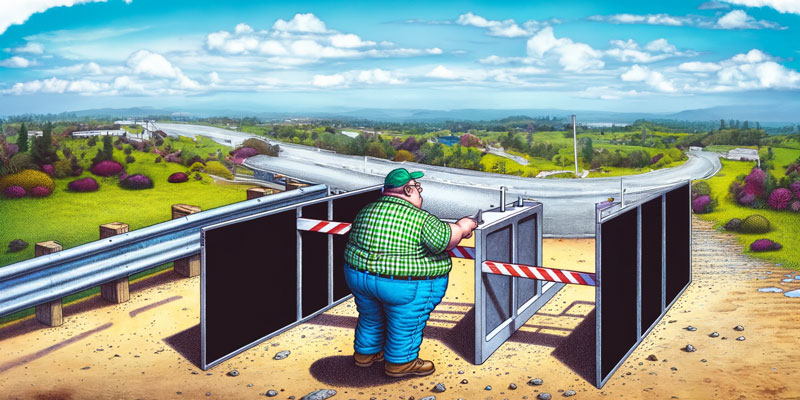
Johnston’s unreachable neighborhood illustrates the problem with insider-ocracy.
Arguably the best investigative reporting currently on offer in Rhode Island is coming from the Johnston Sunrise’s Rory Schuler, and this article about the circuitous route Mayor Joseph M. Polisena Jr. took to secure emergency access to a flooded neighborhood in the city is a great example:
Several sources confirm Polisena had been trying to get help from Gov. Dan McKee’s office throughout the weekend, but the governor’s office was slow to offer solutions. The mayor had 30 constituents who were unreachable by emergency vehicles and minutes mattered.
He contacted the state’s federal delegation — they were on it, but once again, it was a holiday weekend, and an inaccessible neighborhood was unacceptable. The town needed vehicle-access to Belfield Drive, and the water was now too deep for the town’s Humvees to cross (the water had not fully receded following the Dec. 18 storm).
After striking out with the governor’s office, sources reveal Polisena worked back channels to reach Washington D.C., starting with Helena Foulkes, McKee’s Democratic rival (he beat Foulkes to the nomination in 2022).
Foulkes, who serves on Johnston’s School Building Committee, connected town officials with former Rhode Island Gov. Gina M. Raimondo, who now serves as the U.S. Secretary of Commerce. Raimondo connected Polisena’s office to U.S. Secretary of Transportation Pete Buttigieg.
On Wednesday morning, Polisena provided an emergency agreement he signed with the Rhode Island Department of Transportation (RIDOT), seeking Federal Highway Administration (FHWA) approval for a “temporary emergency locked gate access to Interstate 295 from Belfield Avenue in Johnston,” which ultimately permitted the town to start construction at 6 a.m. Wednesday morning.
Step 1 in any analysis is to evaluate the situation, and I see three relevant problem points, here.
First, the state of Rhode Island has poor infrastructure. This manifests, first, in the fact that roadways, generally, can’t process enough water. This is a full-system shortcoming, spreading blame at the state and local levels. Activists attempt to relieve that blame by claiming we’re facing unprecedented problems related to global climate change, but that’s no excuse. Even if you believe that’s the reality, priority #1 of elected officials is to ensure that our infrastructure can accommodate the change. It manifests, second, in the layout and development of roadways that leads a single point of egress for this neighborhood. That, frankly, is mostly a local problem.
Second, current regulation is a problem. Understandably, the governments overseeing highway construction, whether federal or state, have an interest in preventing major throughways from becoming subject to cross-traffic. Route 95, for instance, can’t become Route 1. They serve different purposes. Nonetheless, provision must be made for emergencies, and it shouldn’t take extreme circumstances to lay the foundation for local governments to build access to highways for emergency purposes.
Third, the combined effect of all of the above is to put a huge amount of discretionary power in the hands of a few connected people. This is perhaps the greatest of the downstream consequences of our current system. Some speculate that McKee is not friendly with Polisena, so he wouldn’t help. That can only be the case if we’ve created a situation in which special help is needed and it has to filter through the governor’s office. The fact that the Foulkes->Raimondo->Buttigieg route appears to have worked does not change the problem; it only makes it a national problem. It’s not good that these people have discretionary authority over something so predictable and so local.
It helps to imagine a specific situation when testing these systemic questions. Imagine the mayor of Johnston were a Republican, and imagine further that he (or she) had been spotted as somebody primed for the national stage — perhaps a Presidential contender, one day. Would Buttigieg have granted him (or her) the political coup of proving to be somebody who could get things done for constituents? One needn’t be very cynical to respond, “no,” which means that the direct and specific emergency needs of people in that neighborhood are vulnerable to entirely unrelated and prospective political calculations of partisans.
That’s really not healthy, and Rhode Islanders across the political spectrum should be asking how we can move our system to something that isn’t so obviously insane.
Featured image by Justin Katz using Dall-E 3 and Photoshop AI.


How many more examples do we need that McKee is a Totally, Incompetent, IDIOT!!!